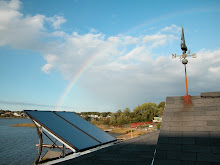Heat 101-"Heat travels from hot to cold...always."
Question: What is the coldest isle in the supermarket? If you said the frozen food isle, you'd be wrong. All the isles are the same temperature, you just feel cold because the heat from your body radiates directly to the cold freezers. This is like being outside in the sun. You feel warm because the sun is heating you through radiation. When a cloud passes in front of the sun, you suddenly feel cooler. The temperature hasn't changed, you just feel cooler because instead of absorbing heat from the sun, you are transmitting heat to the objects around you. Now apply this concept to your home. With radiant floor heating, you heat the objects in a room through radiation instead of heating the air in the room through the convection of conventional heating systems. Why is this important? Simple, air is an insulator. It takes a lot of energy to heat air.
Since you use the entire area of your floor to heat the room, lower water temperatures are needed to get the same heat output as a radiator. In a conventional heating system, you have a heating curve. Hot air rises, so you will have a high ceiling temperature and a low floor temperature. Radiant heating systems have a reverse heating curve, meaning a high floor temperature and low ceiling temperature. The heat stays low, where you want it. The majority of your heat loss is infiltration, heated air leaking out through doors and windows. Since you are heating the objects in the room with radiant heat instead of the air, you drastically reduce your infiltration loss. Also, with a radiant floor, you are basically in direct contact with your radiator. Because of this, people tend to keep their thermostat three degrees lower than they normally would. Lowering your thermostat one degree will save 3% of your energy consumption.
Combining the lower water temperature, reverse heating curve, saving on infiltration losses, and lower thermostat settings, a radiant heating system can save 30%-50% of your heating costs. A radiant heating system seems like a no brainer to me, but I make a living installing them, so I'm biased.
Subscribe to:
Post Comments (Atom)

1 comment:
What a helpful post!
Post a Comment